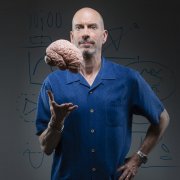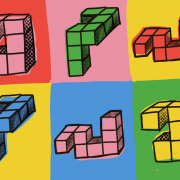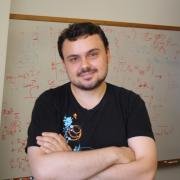June 9, 2021 - 7:30 pm
ISSNAF, the Italian Scientists and Scholars in North America Foundation, annually awards the Young Investigator Awards in various disciplines to outstanding, early-career Italian researchers working in the United States or Canada, in recognition of their significant and innovative contributions to their field of research.
ISSNAF is very pleased to announce the Young Investigator Awards of 2021 and is grateful to their sponsors for their...
June 8, 2021 - 2:00 pm
This seminar talk will be hosted remotely via Zoom.
Prof. Robert D. Nowak, University of Wisconsin-Madison
Abstract: This talk presents a variational framework to understand the properties of functions learned by neural networks fit to data. The framework is based on total variation semi-norms defined in the Radon domain, which is naturally suited to the analysis of neural activation functions (ridge...
May 24, 2021 - 10:30 am
The correct answer is: squishiness
Story by Ben Dickson
Since the early years of artificial intelligence, scientists have dreamed of creating computers that can “see” the world. As vision plays a key role in many things we do every day, cracking the code of computer vision seemed to be one of the major steps toward developing artificial general intelligence.
But like many other goals in AI, computer vision has proven to be easier said than done...
May 11, 2021 - 4:00 pm
Prof. Earl K. Miller, Picower Institute for Learning and Memory, BCS Dept., MIT
Host: Prof. Matt Wilson (MIT)
Abstract: Working memory is the sketchpad of consciousness, the fundamental mechanism the brain uses to gain volitional control over its thoughts and actions. For the past 50 years, working memory has been thought to rely on cortical neurons that fire continuous...
Abstract: Working memory is the sketchpad of consciousness, the fundamental mechanism the brain uses to gain volitional control over its thoughts and actions. For the past 50 years, working memory has been thought to rely on cortical neurons that fire continuous...
May 11, 2021 - 9:30 am
Simultaneous measurement of neural rhythms and spikes across five brain areas reveals how propofol induces unconsciousness.
David Orenstein | Picower Institute for Learning and Memory
In a uniquely deep and detailed look at how the commonly used anesthetic propofol causes unconsciousness, a collaboration of labs at the Picower Institute for Learning and Memory at MIT shows that as the drug takes hold in the brain, a wide swath of regions become...
May 10, 2021 - 12:30 pm
by Ben Dickson
Welcome to AI book reviews, a series of posts that explore the latest literature on artificial intelligence.
Since the early years of artificial intelligence, scientists have dreamed of creating computers that can “see” the world. As vision plays a key role in many things we do every day, cracking the code of computer vision seemed to be one of the major steps toward developing artificial general intelligence.
But like many other...
May 4, 2021 - 2:30 pm
Hosted via Zoom
Prof. Alan L. Yuille (JHU)
Abstract: Current AI visual algorithms are very limited compared to the robustness and flexibility of the human visual system. These limitations, however, are often obscured by the standard performance measures (SPMs) used to evaluate vision algorithms which favor data-driven methods. SPMs, however...
May 2, 2021 - 10:00 am
Computer models that mimic humans’ extraordinary hearing abilities could improve treatments for hearing loss.
Anne Trafton | MIT News Office
The human auditory system is a marvel of biology. It can follow a conversation in a noisy restaurant, learn to recognize words from languages we’ve never heard before, and identify a familiar colleague by their footsteps as they walk by our office.
So far, even the most sophisticated computational models...
April 27, 2021 - 4:00 pm
Dr. Ben Deen (Rockefeller University)
Host: Prof. Winrich Freiwald (Rockefeller University)
Abstract: What is the cognitive and neural architecture of core reasoning systems for understanding people and places? In this talk, we will outline a novel theoretical framework, arguing that internal models of people and places are implemented...
Abstract: What is the cognitive and neural architecture of core reasoning systems for understanding people and places? In this talk, we will outline a novel theoretical framework, arguing that internal models of people and places are implemented...
April 13, 2021 - 4:00 pm
Panelists: Profs. Talia Konkle (Harvard), Josh Tenenbaum (MIT), and Sam Gershman (Harvard)
Moderator: Prof....
Abstract: TBA
This panel discussion is being hosted via Zoom.
Zoom link: https://mit.zoom.us/j/98767476352
This panel discussion is being hosted via Zoom.
Zoom link: https://mit.zoom.us/j/98767476352
April 12, 2021 - 11:45 am
Memory permits the reuse of past cognitive computations
Psychologists and neuroscientists have long studied memory using experimental tasks in which people or animals are presented with some information and then later asked to make judgments about it. This approach has led to a view of memory as a system specialized for solving these kinds of recollection tasks. Recent work by scientists at the Center for Brains, Minds, and Machines (CBMM)...
April 6, 2021 - 4:00 pm
Dr. Andrei Barbu, InfoLab, CSAIL
Host: Prof. Boris Katz (CSAIL, MIT)
Abstract: Children acquire language from very little data by observing and interacting with other agents and their environment. We demonstrate how by combining methods from robotics, vision, and NLP with a compositional approach, we can create a semantic parser...
Abstract: Children acquire language from very little data by observing and interacting with other agents and their environment. We demonstrate how by combining methods from robotics, vision, and NLP with a compositional approach, we can create a semantic parser...
March 30, 2021 - 4:00 pm
Hosted via Zoom
Prof. Aude Oliva, Senior Research Scientist, CSAIL; MIT Director MIT-IBM Watson AI Lab; Director MIT Quest...
Dear Friends,
Unfortunately, Prof. Aude Oliva is feeling unwell and we have canceled today’s talk “Mapping Responses in the Human Brain Through Space and Time.” We will reschedule this talk in the near future.
---
Host: Prof. Leyla Isik (JHU)
Abstract: The human brain is a time machine; We are...
Unfortunately, Prof. Aude Oliva is feeling unwell and we have canceled today’s talk “Mapping Responses in the Human Brain Through Space and Time.” We will reschedule this talk in the near future.
---
Host: Prof. Leyla Isik (JHU)
Abstract: The human brain is a time machine; We are...
March 30, 2021 - 12:00 pm
The purpose of play — for children, monkeys, rats or meerkats — has proved surprisingly hard to pin down. Scientists continue to toss around ideas.
By Chris Woolston
Anyone who has ever chucked a tennis ball in the general vicinity of a border collie knows that some animals take play very seriously. The intense stare, the tremble of anticipation, the apparent joy with every bounce, all in pursuit of inedible prey that tastes like the backyard....
March 29, 2021 - 9:15 am
Jarrod Hicks (MIT) and Dr. Mengmi Zhang (Children’s, Harvard) have been selected as semifinalists in the 2021 Reach Out Science Slam Communication Challenge, which is jointly sponsored by the National Science Foundation (NSF) and the Museum of Science, Boston. The Reach Out Science Slam is a nationwide effort to boost the communication skills of early-career researchers affiliated with the NSF’s 12 flagship Science and Technology Centers (...















